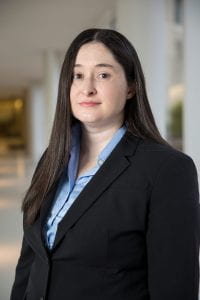 INDIANAPOLIS, Ind. – Algorithms and analytics are now common used by professional sports, in sales forecasts, lending decisions and by car insurance providers. Managers and other decision makers no longer simply “go with their gut.” But doctors often remain reluctant to introduce such information when making medical decisions for patients.
INDIANAPOLIS, Ind. – Algorithms and analytics are now common used by professional sports, in sales forecasts, lending decisions and by car insurance providers. Managers and other decision makers no longer simply “go with their gut.” But doctors often remain reluctant to introduce such information when making medical decisions for patients.
In an article published in Science, Helen Colby, an assistant professor of marketing at the Indiana University Kelley School of Business in Indianapolis, and a co-author note that it is time for many doctors to stop relying on their use of mental shortcuts, usually called decision rules or heuristics, when making decisions about patient care with limited cognitive resources.

Colby, who researches health decision-making, and Meng Li, an associate professor and director of undergraduate studies in the Department of Health and Behavioral Sciences at the University of Colorado Denver, were invited to provide commentary on a paper also published in Science by Manasvini Singh, an assistant professor of health economics at the University of Massachusetts.
Colby and Li’s article, “Physicians’ flawed heuristics in the delivery room; Complicated childbirths can influence later decision-making,” also appears in the Oct. 15 edition of the journal.
Using electronic health records of more than 86,000 deliveries, Singh found that delivering physicians were influenced not just by the indications of the current patient but also by the outcome of their most recent previous delivery. For example, when a physician experienced a negative outcome with a vaginal delivery they were more likely to choose to deliver the next baby by cesarean section and vice versa.
“Most of the time, the heuristics do save time and resources and they produce pretty good outcomes. But in some situations, pretty good is not good enough,” Colby said. “When lives are on the line, any improvement in decision making can have life-saving consequences.”
Colby and Li highlight that a “win-stay-lose-shift” heuristic has been identified in other contexts as a learning strategy, but said it only works well in certain settings.
“In the medical context, this heuristic would be rational only if the specifics of the prior patient matched the specifics of the current patient and thus provided a useful learning experience. In that case, if one patient’s delivery went wrong, it can tell the physician that the same delivery plan may not work well with another patient with very similar characteristics and indications,” they wrote. “However, two patients who happen to have consecutive deliveries by the same physician are not expected to be highly similar.”
They are not suggesting that physicians’ use of these mental shortcuts lack expertise or training, but the research demonstrated that it a common tendency, even among more experienced doctors.
Colby and Li offer several suggestions to help physicians overcome their reliance on maladaptive heuristics or decision rules.
First the phenomenon needs to be acknowledged within the profession without condemning physicians.
“Although understanding decision biases usually does not entirely ameliorate them, teaching doctors about heuristics may promote the acceptance of potential interventions,” they wrote. “More research and clinical efforts need to focus on designing and testing decision aids that are beneficial to patients and user-friendly to physicians.
“In addition to making sure that the decision aid has a high degree of scientific accuracy in recommending the optimal treatment option, studies also need to examine whether physicians will accept and use such recommendations,” they added. “Physicians may have understandable concerns about recommendations from a ‘black box.’”
Colby also said this is not an attempt to sound an alarm on doctors or castigate them for not always making optimal decisions. Rather, it simply highlights an important fact – like all experts, doctors are human.
“We patients, and often the doctors themselves, want to think of doctors and other healthcare staff as omniscient and omnipotent – a bastion of strength when we are in our time of need,” she said. “Doctors are regularly rated as the most respected profession in the United States, and a recent study found that doctors are often ascribed godlike powers.
“We cannot seek to assist medical decision making without first admitting the nature of the decision makers,” she added. “Helping doctors to make better decisions through reduced reliance on heuristics and decision rules should be a public health priority … It may be scary to admit that doctors are human, but it is the best thing we can do to help them, and ultimately to help them help us.”
Leave a Reply